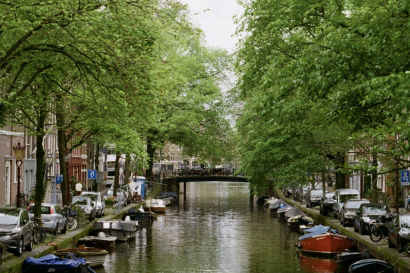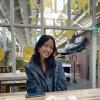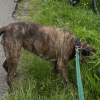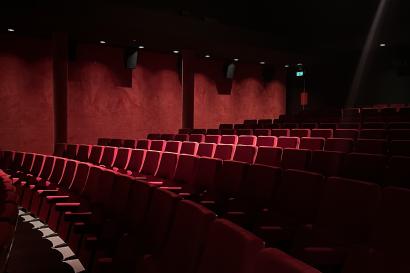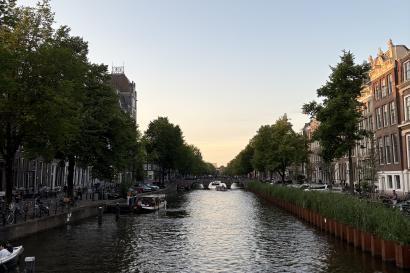Last semester I took a positive psychology course at the IES Abroad center, taught by the amazing Marianna Pogosyan. In short, the course changed my life. I couldn’t have taken it at a better time in my life. I was in a new city (never mind a whole new country and continent, my mom joking that I keep moving farther and farther from California). I didn’t know a single person nor a word of Dutch. It was a slightly frightening feeling to arrive at the Social Hub West with all my bags, impressively alone and far from familiarity, but I was excited because there was so much ahead of me, and thus so much to learn. Marianna’s class about the budding field of positive psychology, with lessons about the science of gratitude, awe, and happiness, started to apply all too well to my new life in Amsterdam. I attribute much of my changed world-view and self-perception to her course and I am forever grateful for her wonderful teaching.
One of the things I remember most and still carry with me is the day we talked about the positivity offset. Positivity offset describes the way most people generally experience a baseline level of happiness; thus, as Marianna put it, interacting with a stranger is more likely to elicit a positive interaction than a negative one. I experienced this recently on the plane to Split, Croatia. The flight was only two hours, but delayed forty five minutes, and the entire travel time was just long enough for me to steadily develop a profound headache. Unable to fall asleep, I pulled out my sketchbook. As I was doodling, I noticed in my periphery that the older gentleman sitting to the left of me, an artistic looking man himself, kept glancing over at my page. He was wearing a loose yet sturdy green jacket, a Nikon digital camera looped around his neck and resting in his hand (he never let it go throughout the duration of the flight). Hanging from his right ear was a small silver hoop with an elegant black stone. Because of the black N95 mask covering the bottom half of his face, I could only see his bright blue eyes, softened with laugh lines. When I finished one sketch and moved onto another, he eventually leaned over and commented, Wow, that is just amazing. I thanked him, flipping back to the page so he could get a proper look. He said that my art reminded him of a tattoo artist friend of his, and went on to talk about his preferences for art, pen and pencil versus paint, abstract versus illustration. I pushed through my beating headache and introduced myself, shaking his hand between our cramped seats.
Our conversation wandered from tattoos (he himself used to be a tattoo artist) to art to our reasons for going to Croatia to our observations of Amsterdam, himself being born and raised in Amsterdam. I liked his pace of speech, easy and deliberate. I asked what he did for a living and he smiled with his eyes overjoyed to talk about his interest in natural medicine, particularly for Eastern methods. I’m moving to Croatia first because the healthcare in Amsterdam cannot help me, he said, going on to talk briefly about his autoimmune disease and how much herbal remedies have helped him. I also just like the lifestyle of Croatians more. In Croatia, he laughed with a twinkle in his eyes, they say if you can do it tomorrow, just do it tomorrow.
As the plane descended over Split, our conversation found a natural conclusion as we both gazed out the window at the red-tiled roofs and emerald tree tops. My head felt like it was filled with lead and about to roll off my shoulders, but I shook hands with him again and thanked him genuinely for the conversation. I disembarked, stunned by the sunlight, and met up with my friends on the blinding white tarmac. The gentleman walked off with his suitcases alone, camera in hand. We waved to each other, and then I turned to my friends and exclaimed, I made a friend on the plane!
I now have a story to tell when someone asks me about those drawings. His dangling earring, his interest in ancient Eastern medicine, are pasted into that page in my sketchbook. His quip about Croatians doing things tomorrow if they can help it, stayed in my mind for the rest of the trip.
Overall, the Dutch, like my friend from the plane, are warm, amicable people. I take note of their friendliness especially when I visit another country, aware of the difference in behavior. When my friends and I went to Croatia, we all noticed how the locals were slightly standoffish, shuffling past without a smile, eyes fixed on the ground. The people in Amsterdam are genuine, look you in the eye when they speak to you, offer well-meaning smiles and gestures, and are open to starting conversations. I was sitting at Waterlooplein one evening, holding a Miffy stuffed animal my friend and I had just purchased together, and chatting on the phone with my mom. A little boy playing with his mother on a nearby bench wandered over to me, innocently eyeing the toy. His mom called to me, You’ve certainly got his attention! I handed the toy to him with a smile to his mother, still holding the phone to my ear. The boy’s mother asked, Are you sure? The little boy was overjoyed, holding the Miffy up to the clouds, squeezing its plush body, and tossing it around on the ground. The mother seemed horrified that he was dirtying my brand new purchase, but I just laughed it off, told my mom I would call her later, and gently asked for the toy back. The little boy gave it back right away but remained standing in front of me, declaring something to me in Dutch I didn’t understand. I ended up having a nice conversation with his mother while letting her son continue playing with my toy, keeping one eye out.
Even with the language barrier, I will find myself having a pleasant conversation with someone. Like just the other day, when an old man asked if he could sit at my table, sat down, sipped his coffee, and then asked me in unsteady English, Where are you from? He pointed to my drawing and waved his hands in extravagant motions, grinning and implying how impressed he was. He pointed to the sky and started speaking to me in Dutch, and I picked up a few words about flowers and the weather. Then he finished off his last sip of coffee, and walked off, turning to give me a firm and pleasant wave goodbye.
Sometimes, not even a word is said. One afternoon, in a quaint little park next to UvA, I was sitting on a bench reading next to an older man. He was very nicely dressed in a green wool jacket, black and white striped scarf, jeans, and neutral toned sneakers. I remember noting what a clean outfit he had on. He didn’t have a book or phone or anything in hand. He just sat on the opposite end of the bench from me, looking around at the blossoms, the sky, the people laughing on the boats drifting by on the canal, the long bent arms of the willow tree tracing the surface of the water, the heron alighting down to the bank. Occasionally, he closed his eyes, as if to maximize his enjoyment of the sunlight, but mostly he just sat and watched the park while I sat next to him and read. Then, after about four chapters of my book, after the heron had flown away without my noticing, and while a little black and white bull terrier played fetch with himself in the shade of the willow, the man looked over at me and said, Okay, goodbye! stood up, and walked over to his bike as though he had finished a task, the task being to sit and think, sit and watch, glean what he could from the moving elements of the park, everything willing to show up for the day.
I like the term, “social mindfulness”, which I learned in positive psych as well, something I understood but never had the name for. It perfectly describes how interacting with strangers can be genuine while also being completely unattached, like this man at the park. The more different the stranger is from myself, the more my perspectives and world-views expand, and I feel bigger just from talking to a stranger I will never see again.
I find that I have a lot of great conversations with Uber drivers, not just in Amsterdam but also in London and Vienna. Most of the drivers I’ve talked to have been curious about America, what I study in Amsterdam, what I like about the city they are taking me through. Most of the Uber drivers I have talked to have immigrated from Morocco, Turkey, Nigeria, Egypt, and so we find common ground in discussing Amsterdam cultural differences from what we are familiar with. I remember having a conversation with my friend from fall semester about an Uber driver he met in London, who was enthusiastic about visiting America but afraid because of our lack of gun control. It is wild the perceptions you learn when you have even just the smallest, seemingly inconsequential conversation with a stranger.
I talked to that same friend some more about talking to strangers, commenting that one of the traits I like most about him is his ability and willingness to talk to strangers. He told me about a lot of these interactions; deli workers, baristas, Uber drivers in Amsterdam, taxi drivers in New York. I remember, there was one day we were sitting at the park by the lake and he talked to two kids who were messing around in the water. The kids replied, Catching fish, and proudly held up a dirty jar of water to show us. My friend said it is easier to talk to strangers, especially taxi and Uber drivers when there is the shared experience of the drive, because there is nothing to lose. He said he talked to the two kids at the lake because he was genuinely curious about what they were doing and he would never see them again, so why not ask? I agreed with him. I like talking to strangers too; customer service workers at cafes I frequent, owners of friendly dogs, people sitting next to me on planes, trains, or restaurants. I tend to be the friend who sits in the front seat when a group orders an Uber and I find it easy to chat for the duration of the 20 minute ride. With strangers, it does feel like the topics of conversation are endless and there is nothing at stake the way it might be with other students or peers my age.
For one of our “interventions”, or weekly assigned wellness activities (God, I miss this class so much), Marianna asked us to make a social connection, whatever that looked like to us. I remember writing down one of the first interactions with strangers I had in Amsterdam, a conversation and moment in time I remember fondly, for it happened so early in fall semester it would come to represent a turning point for me, while I was still green to Amsterdam.
In the throes of midterms, I took the time out of my Wednesday to bike to the park and read leisurely for a couple hours. The fresh air, the colors and smells of autumn, relieved some of the academic pressure. I was at Rembrandt Park reading a book I’d just picked up on a bench in front of the creek. Almost an hour and half into the book, a man walking with his electric bike approached me and asked if he could sit on the other side of the bench. I said, Of course. He was young, wearing ripped light jeans, a denim jacket over a thin white sweatshirt, and nice sneakers. He started talking to me so I saved my page with a receipt and closed the book. He asked me if I was a student (my backpack was next to me), where I was from, if I spoke French at all because that was his first language. I enjoyed answering his questions and as the conversation flowed, found it easy to ask him the same questions he was asking me. He told me he was from Guinea, spoke French, Dutch, and English but was only proficient in Dutch and not as much in English. A few times, he pulled out his phone to translate a French word into English. He told me he liked talking to new people because it helps him practice his English, to which I responded that his English was very good. In this way, I learned he was only a few years older than me, had been in the Netherlands for almost six years, and was currently doing an internship at an automotive shop. I was compelled by his openness to tell me how he left Guinea because of war, how he lost both of his parents, and was completely on his own here in Amsterdam. I didn’t know what to say in response other than to validate and offer small condolences, but he shrugged and kept smiling, going on about how he loves Amsterdam.
At one point we started to talk about relationships, to which he said, “There are three things needed in a relationship: love, commitment, and trust”. This man, whose name I still didn’t know and he had yet to ask mine, leaned back, looked out over the sunlit creek and the dogs chasing one another just across the water. He spoke mostly about trust, which he said is the most important but hardest to get back once it's gone. I asked him if he had any personal experience, and he said yes, not just in relationships but in friendships too. He was very firm; “Once you lose my trust, it is very hard to get back”. I agreed wholeheartedly with him. I don’t know how long the conversation went on, but it eventually tapered off as he checked the watch on his wrist and said he had to get going. I completely forgot his name when he finally told me. He wished me luck with my studies in Amsterdam. We waved to each other as he mounted and rode off.
As I biked back through the park, I remember reflecting so much on that interaction. I was glad that I said yes when he asked to sit, proud that I replied when he asked me that first question, and appreciative of the insight he offered me. It made me think about my dad, who is always talking to strangers in line, customer service workers, waiters, customers at the table next to him. Talking to that man at the park, I channeled a lot of what I learned from my dad. Even with the minor language barrier (I had to explain via Google translate what it meant to see loved ones “through rose-colored glasses”) we were able to engage in a thought-provoking conversation, and I got an introduction to a person living a completely different life from me, with a completely different history, through a benign, genuine, and enjoyable conversation on a fine autumn day.
I carried the lesson of talking to strangers with me for the rest of fall semester and well into spring. I will probably carry this lesson with me for the rest of my life. What I liked most about these interactions was realizing I couldn’t have known what a good conversation I would have had if I’d walked away, said no, or not responded at all. What came out of each interaction was unexpected and thus more enjoyable. They have taught me how simply human connections can be made, how easily I can drop the pretensions and anxieties of coming across a certain way, and just extend myself kindly to a stranger. In the future, I hope I can summon that feeling again and strike up a conversation with a stranger.
My point is, talk to strangers, in Amsterdam, or wherever you find yourself. The stranger, the better.

Emma Basco
My name is Emma Basco and I am originally from Sacramento, California. I am currently studying literature and writing at Sarah Lawrence College in New York. I love to read on the beach, doodle on post it notes, paint with watercolors, and unearth new cafes and restaurants. My hidden talent is that I can make an excellent pot of noodles from packaged ramen.
